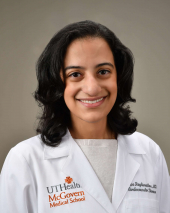Heart disease is the leading killer of men and women in the United States. Unfortunately, women carry an extra burden.
“Women have risk factors that men do not, and they are also more likely to be underdiagnosed,” said Deepa Raghunathan, MD, cardiologist with UT Physicians Multispecialty – The Heights and assistant professor of internal medicine at McGovern Medical School at UTHealth Houston. “However, you’re still in control, and with education and prevention, heart disease doesn’t have to be in your future.”
In recognition of “National Wear Red Day” in February, the doctor explains the three biological risk factors women need to know and the actions they need to take.
Risk Factor 1: Pregnancy
Pregnancy can multiply a woman’s risk of heart disease with high blood pressure, high blood sugar, and/or excessive weight gain.
“If a woman experiences higher blood pressure from preeclampsia or higher blood sugars from gestational diabetes — even if these conditions go away after the pregnancy — she’s more likely to have coronary artery disease or heart failure in the future,” Raghunathan said. “And if a woman gains too much weight and doesn’t lose it post-partum, she’s positioned for high blood pressure, diabetes, and high cholesterol in the future. These all contribute to the development of heart disease.”
Rick factor 2: Menopause
Menopause can elevate a woman’s possibility of heart disease due to the hormonal imbalance it creates.
“Estrogen helps keep blood vessels relaxed and open, and it helps control bad cholesterol. When a woman reaches menopause and stops producing the high levels of estrogen that protect her heart, she is more likely to develop heart disease,” the physician said. “Other diagnoses, such as polycystic ovary syndrome, endometriosis, or premature ovarian failure also affect estrogen production and, therefore, increase the risk of heart disease.”
Rick factor 3: Different symptoms
Symptoms of heart disease may differ for a woman than a man. This can increase her risk of a heart attack if she — or the physician — does not pay close attention to the more subtle signs.
“A woman may not experience chest pain. She may feel fatigue, shortness of breath, heartburn, nausea — even back and jaw pain,” Raghunathan said. “Women were sometimes underdiagnosed when the symptoms they described didn’t match the classic ones of men. That’s because past heart disease studies didn’t include enough women. Physicians are now more keen on the symptoms for women, but many women may not know their symptoms might be related to heart disease.”
Take action
The American Heart Association initiated “National Wear Red Day” to increase awareness of women’s heart health and encourage women to take action.

“‘National Wear Red Day’ is an opportunity to educate the public, and it’s also a reminder to reflect on your health and learn your risk for heart disease. When you see others dressed in red, that should serve as a reminder to check your numbers,” Raghunathan said.
According to the cardiologist, it is important for a woman to know three important “numbers”: blood pressure, blood sugar, and blood cholesterol. These three factors will indicate if she is at low, moderate, or high risk for heart disease.
“These numbers may already be on record with your primary care physician. If they haven’t been checked or it’s been several years, it’s a good time for you to make an appointment with a physician to determine your risk. You will then receive personalized advice to reverse the risk of developing heart disease,” she said.



